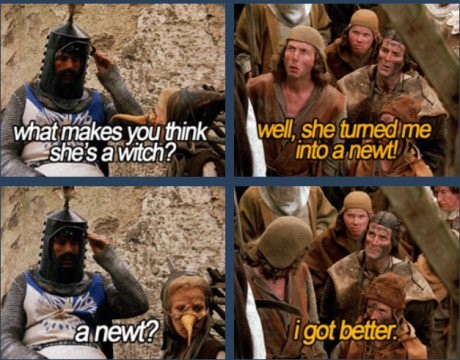Alexander Ayer
Witchcraft. The very word congers up a myriad of different images, thoughts, and ideas. From popular fiction series about children learning spells to the older fairy tales of the Brothers Grimm, our culture is inundated with tales of magic and those who practice it. However, there was a time in the past when people lived in fear of those they believed possessed malevolent powers. Most people in America today see the idea of witches as the realm of pure fantasy. Further, the days of people accusing each other of actually being witches, and carry out hunts to purge these perceived threats have surely long past. This must have been the product of a darker and more ignorant time in human history.

Well, witch trials are not just the product of a bygone era where angry mobs dragged oddly hatted women into the center of town claiming she turned someone into a newt. More than 2,000 people have been killed in witch hunts between 2000 and 2015 in India alone.[1] Even more troubling, the practice of witch burning has surfaced in both Asian and African nations.[2]
The Problem
This problem has manifested in several countries around the world, particularly in central and south-east Asia, as well as sub-Saharan Africa. However, this post will be restricted primarily to India, because there has been some fairly reliable reporting on the frequency of these allegations as well as some recent developments.
Troublingly, just as in the darker days of old, witchcraft allegations are primarily aimed at the most vulnerable in a society; women, the old, the young, the disabled, and those who are too different.[3] Women, just as in the days of Europe’s witch hunts, are particularly vulnerable to these accusations due to ingrained social views in more rural and isolated areas.[4] Of the approximately 2000 people killed in India in recent years most have been women.[5] One particular trend aimed at landed women has been using witchcraft allegations to seize property. Land-owning women are accused of witchcraft, and then firewood for a pyre is gathered in view of their homes. The older women who are usually the targets of these scheme will then flee and their land will be seized.[6]
However, witchcraft allegations are not always used as a thinly veiled cover for privet gain. There are people who genuinely believe in witchcraft and its potential for harm.[7] Worse, there are people who are accused of witchcraft who come to believe it themselves. Some individuals think that they are possessed by evil spirits, or are under the sway of demons and thus might be capable of inflicting magical harm on their neighbors even if they don’t understand how.[8]
Fear and lack of knowledge seems to be the fuel that causes witch frenzies to burn the brightest. Many communities which have seen a rise in witch hunts lack sufficient medical care and education.[9] When confronted with deadly and infectious deceases or other misfortunes many of these communities have turned on each other and blame the already weak or disenfranchised.[10] However, witchcraft has been blamed for other problems as well, including cancer, the death or a child or other family member, or a poor harvest.[11]
Accused witches can face a number of problems. Once branded a witch an individual may be shunned, beaten, banished, beheaded, or even burned alive.[12] These trials and hunts are notoriously lacking in due process. In one incident in 2014, an Indian athlete attended a village meeting after the deaths of four village members, once there she was accused of witchcraft, trapped with a net, and beaten until she lost consciousness.[13] In some cases treatment may even rise to the level of torture; where in addition to suffering severe physical harm, accused individuals may be forced to consume poisonous liquids, animal blood, or human waste.[14]
Just How Bad Is It?
It has been hard for authorities to get a sense of how wide spread the problem has become. Apart from incidents going unreported or being reported as something else, one particular issue has been the fact that most incidents have been occurring in rural or isolated areas.[15] However, the UN estimates that the number could be as high as the tens of thousands killed, and millions harmed in other ways worldwide.[16] Further, just because most of these incidents have occurred in more remote areas, some have not. The U.N. Human Rights Council has been receiving reports from neighboring Nepal that witchcraft allegations are spreading to more developed areas.[17]

How Did I Not Know This Was Happening!
One of the major difficulties is the unwillingness of some countries to acknowledge these witch hunts are even happening. UN officials have been pushing various governments to acknowledge and address the problem, but there has only been moderate successes thus far.[18] Many governments and local authorities have traditionally been reluctant to intervene, viewing most of it as cultural in nature and thus not wanting to get involved. In other cases, authorities simply lack the resources to fight the poverty and lack of knowledge that spreads much of the witch hunt zeal.[19]
Is There Hope?
Hope does endure. This problem has been defeated before. Witch hunts where far more common in Europe during the 16th century and even occurred in America for a time during the 17th century. They ended, and witch hunts around the world can end as well.
Ignorance and fear are the cause, and poverty is an exacerbating problem. These are factors which can be addressed. South Africa has done as much, stemming a witch hunt pattern in their country by launching an education program about the scientific and medical causes of many diseases such as HIV and AIDS.[20] South Africa has also begun holding tribal leaders responsible by warning that, if a person is accused and is killed for witchcraft, the South African authorities would get involved and my hold the leaders themselves responsible.[21]

Action has begun to take place in India as well. In the Indian state of Assam, where witch hunts have been a serious problem, a law was passed in recent years banning witchcraft accusations and making such accusations punishable with possible imprisonment.[22] In The five years between 2001 and 2006 Indian police authorities believe that approximately 300 people were killed in witch hunts in Assam, now advocates are hoping the law will help end this nightmare.[23]
The UN is still determined to get countries to acknowledge and address witch hunting practices. The U.N. High Commissioner of Human Rights stated in relation to witch trials in Liberia that “… human rights obligations must take precedence over any local practices considered to be ‘cultural’ or ‘traditional’ where such practices are incompatible with human rights principles.”[24]
My Thoughts
I think this is a practice which can be beaten once and for all. It is not enough to simply go to these places and explain that the accused are not witches, this has been ineffective in the past.[25] The first step in solving this disaster is to acknowledge that it is happening. The UN has been trying to push more governments to publicly acknowledge that these events are happening in their boarders.[26] I think this is where the solution has to start. It is hard to address a problem while simultaneously ignoring it.
South Africa’s policy of education is great idea. If people understand the scientific causes behind their misfortunes they are less likely to attack the vulnerable. There is genuine concern due to the spread of infectious disease, possible crop failures, and loosing loved ones. However, it is a lack of understanding which leads to people seeking their own answers by turning on their neighbors. Let us use knowledge to kill ignorance.
There must also be more social help for the accused. The accused must feel as though going to the authorities will help them, and that means the authorities must be willing to get involved to end this heinous practice. India’s law, providing some legal protection for the accused by making it illegal to openly carry out witch trials, is an excellent way to start. Further medical support and economic development would probably also help these already stressed communities from descending down the dark road of the witch hunt.
This human rights nightmare can be ended. We know what it will take, and we have existing models to work from, both from history and the present day. We have ended this scourge before, let us do so again.
Alexander Ayer is a third year (3L) law student at the University of Baltimore School of Law. His undergraduate studies were completed at Hood College, where he majored in history and graduated cum laude in 2014. Alexander is expected to graduate from the University of Baltimore School of Law in the Spring of 2017. As part of his international law background he took part in a study abroad program at the University of Aberdeen School of Law in Scotland. Alexander is drawn to international law by the comparative approach of seeing how different societies solve similar problems in different ways, as well observing how history has effected the laws and policies of various nations, and the behaviors demonstrated by counties interacting with each other on the world stage. In addition to international law, Alexander is also interested in disability law and copyright law.
[1]http://www.nytimes.com/2016/02/25/world/asia/india-assam-state-witch-hunts.html?_r=0
[2] http://nationalgeographic.org/news/witch-trials-21st-century/
[3] http://www.reuters.com/article/us-religion-witchcraft-idUSTRE58M4Q820090923, http://nationalgeographic.org/news/witch-trials-21st-century/, & http://www.ohchr.org/en/NewsEvents/Pages/DisplayNews.aspx?NewsID=16904&LangID=E
[4] https://www.washingtonpost.com/news/morning-mix/wp/2014/07/21/thousands-of-women-accused-of-sorcery-tortured-and-executed-in-indian-witch-hunts/
[5] http://www.nytimes.com/2016/02/25/world/asia/india-assam-state-witch-hunts.html?_r=0
[6] http://nationalgeographic.org/news/witch-trials-21st-century/
[7] http://www.bbc.com/news/world-asia-india-35975360 & http://www.nytimes.com/2016/02/25/world/asia/india-assam-state-witch-hunts.html?_r=0
[8] http://www.nytimes.com/2016/02/25/world/asia/india-assam-state-witch-hunts.html?_r=0, http://www.bbc.com/news/world-asia-india-35975360, http://www.nytimes.com/2016/02/25/world/asia/india-assam-state-witch-hunts.html?_r=0
[9] http://nationalgeographic.org/news/witch-trials-21st-century/
[10] http://www.bbc.com/news/world-asia-india-35975360
[11] http://www.nytimes.com/2016/02/25/world/asia/india-assam-state-witch-hunts.html?_r=0 & https://www.washingtonpost.com/news/morning-mix/wp/2014/07/21/thousands-of-women-accused-of-sorcery-tortured-and-executed-in-indian-witch-hunts/
[12] http://www.bbc.com/news/world-asia-india-29655662
[13] http://www.bbc.co.uk/news/world-asia-india-29655662
[14] https://www.washingtonpost.com/news/morning-mix/wp/2014/07/21/thousands-of-women-accused-of-sorcery-tortured-and-executed-in-indian-witch-hunts/
[15] https://www.washingtonpost.com/news/morning-mix/wp/2014/07/21/thousands-of-women-accused-of-sorcery-tortured-and-executed-in-indian-witch-hunts/
[16] http://www.reuters.com/article/us-religion-witchcraft-idUSTRE58M4Q820090923
[17] http://www.reuters.com/article/us-religion-witchcraft-idUSTRE58M4Q820090923
[18] http://www.reuters.com/article/us-religion-witchcraft-idUSTRE58M4Q820090923
[19] http://www.ohchr.org/en/NewsEvents/Pages/DisplayNews.aspx?NewsID=16904&LangID=E & http://nationalgeographic.org/news/witch-trials-21st-century/
[20] http://nationalgeographic.org/news/witch-trials-21st-century/
[21] http://nationalgeographic.org/news/witch-trials-21st-century/
[22] http://www.nytimes.com/2016/02/25/world/asia/india-assam-state-witch-hunts.html?_r=0
[23] http://www.reuters.com/article/us-religion-witchcraft-idUSTRE58M4Q820090923
[24] http://www.ohchr.org/en/NewsEvents/Pages/DisplayNews.aspx?NewsID=16904&LangID=E
[25] http://nationalgeographic.org/news/witch-trials-21st-century/
[26] http://www.reuters.com/article/us-religion-witchcraft-idUSTRE58M4Q820090923


December 2, 2016 at 3:46 am
I never thought about this in the international sense but it makes sense! While in Ghana this summer we were told about the “witches camps” in the north of the country. Essentially women who were outcast and ostracized from society were rounded up and sent there. Their mental health illness often being diagnosed as witchcraft. Do you think there is a correlation between lack of psychiatric care and incidence of “witchcraft’?
December 17, 2016 at 4:07 am
The problem is a lot more wide spread than I had realized even a short time ago. I had hoped that we had closed this dark chapter of human history, unfortunately it continue in many places around the world. I did read a little about the witch camps in Ghana. Did you learn any more about the women living there? Or what the wider society in Ghana thinks about their situation?
Personally, in some cases I do think a lack of psychiatric care can play a roll in the witch hunt epidemic. I don’t have statistical evidence to indicate how large the issue is, unfortunately. However, I have heard individual accounts that testify that the mentally ill have been the targets of witchcraft allegations. These accusations tend to target the already vulnerable, and the disabled and unwell have been targeted in the past.
What makes the attack of the mentally ill particularly troubling is that, in some cases, the afflicted come to believe they are in fact guilty. Because they don’t understand what is happening to themselves anymore than their community, the mentally ill can become convinced that they are in fact the source of their communities suffering. In these cases not only do we have to work to convince the society that they are mistaken, but also the accused themselves. It’s not easy work. However, the mentally ill need help. We can’t allow these cycles of violence to continue.
March 16, 2018 at 2:09 am
Sorry, but you’re incorrect — “witch hunts” do still occur in the United States and some of these people accuse you in churches.